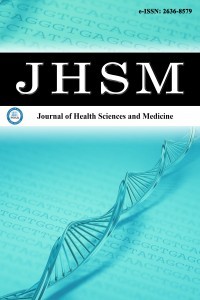Evaluating mental health literacy in a university hospital: A cross-sectional study
Objective: Mental state and social condition are integrally linked to a person’s physical health. The present study investigates the mental health literacy levels of patients aged 30–50 years who presented to the outpatient clinics of training and research hospital, as well as the relationship between mental health literacy and sociodemographic characteristics.
Material and Method: This cross-sectional study included 522 patients aged 30–50 years who presented to the Adult Outpatient Clinics of Karabuk University Training and Research Hospital between October and December 2021. The participants were administered a two-part, 33-item face-to-face questionnaire, in which the first part included 11 items assessing sociodemographic characteristics, and the second part included a 22-item scale comprising three (knowledge, belief, and resource-oriented) subscales for the measurement of the level of Mental Health Literacy (MHL).
Results: The mean scores of knowledge, belief and resource-oriented subscales were 8.92±0.98, 1.16±0.92 and 3.37±0.71, respectively, and the mean total MHL scale score was 13.46±1.39. The participants' education level, employment status, financial status, presence of chronic and psychiatric diseases, and psychiatric medication were significantly associated with the MHL scale scores (p=0.013, p=0.023, p=0.024, p=0.000, p=0.000 and p= 0.000, respectively).
Conclusion: As the level of MHL increases, so does the person’s awareness of the symptoms of mental health disorders and the correct use of appropriate treatment resources. It is believed that training programs aimed at improving mental health literacy will improve health-related social outcomes, thereby reducing the burden of disease.
Keywords:
Mental disorders, health literacy, mental health, humans,
___
- World Health Organization (2006). Constitution of the World Health Organization Basic Documents. https://apps.who.int/iris/handle/10665/43432, Access date: April 21, 2022.
- Kutcher S, Wei Y. School mental health literacy. Education Canada 2014; 54:22-6.
- Kanj M, Mitic W. 7th Global Conference on Health Promotion, Promoting Health and Development: closing the implementation gap. Nairobi, Kenya, 26–30 October 2009. https://www.who.int/teams/health-promotion/enhanced-wellbeing/seventh-global-conference, Access date: April 20, 2022.
- World Health Organization (2011). Mental health and substance use. https://www.who.int/mental_health/en/., Access date: April 21, 2022.
- Mancuso J. Health literacy: A concept/dimensional analysis. Nurs Health Sci 2008; 10: 248-55.
- Jorm AF, Korten AE, Jacomb PA, Christensen H, Rodgers B, Pollitt P. ‘Mental health literacy’: a survey of the public’s ability to recognise mental disorders and their beliefs about the effectiveness of treatment. Med J Aust 1977; 166: 182-6.
- Jung H, von Sternberg K, Davis K. Expanding a measure of mental health literacy: development and validation of a multicomponent mental health literacy measure. Psychiatry Res 2016; 243: 278-86.
- Göktaş S, Işıklı B, Önsüz MF, Yenilmez Ç, Metintaş S. Evaluation of Turkish validity and reliability of the mental health literacy scale (Rsoy Scale). Konuralp Med J 2019; 11: 424-31.
- Oztas B, Aydoğan A. Determination of mental health literacy levels of health professionals. J Psychiatr Nurs 2021; 12: 198-204.
- Seki HÖ. Investigation of mental health literacy of individuals living in a city center. Humanistic Perspective 2021; 3: 660-75.
- Kaneko Y, Motohashi Y. Male gender and low education with poor mental health literacy: a population-based study. J Epidemiol 2007; 17: 114-9.
- Lee HY, Hwang J, Ball JG, Lee J, Albright DL. Is health literacy associated with mental health literacy? findings from mental health literacy scale. Perspect Psychiatr Care 2020; 56: 393-400.
- Al-Yateem N, Rossiter R, Robb W, et al. Mental health literacy among pediatric hospital staff in the United Arab Emirates. BMC Psychiatry 2017; 17: 390.
- Miles R, Rabin L, Krishnan A, Grandoit E, Kloskowski K. Mental health literacy in a diverse sample of undergraduate students: demographic, psychological, and academic correlates. BMC Public Health 2020; 20: 1699-712.
- Farrer L, Leach L, Griffiths KM, Christensen H, Jorm AF. Age differences in mental health literacy. BMC Public Health 2008; 8: 125.
- Mehrotra K, Nautiyal S, Raguram A. Mental health literacy in family caregivers: a comparative analysis. Asian Journal of Psychiatry 2018; 31: 58-62.
- Wang J, Lai D. The relationship between mental health literacy, personal contacts and personal stigma against depression. J Affective Disord 2008; 110: 191-6.
- Yayın Aralığı: Yılda 6 Sayı
- Başlangıç: 2018
- Yayıncı: MediHealth Academy Yayıncılık
Sayıdaki Diğer Makaleler
Ahmet KARAYİĞİT, Dursun Burak ÖZDEMİR, Hayrettin DİZEN, Bülent ÜNAL
Burcu KORKUT, Pınar KALEM, Habibe İNCİ, Ahmet MİRZA, İshak Oğuz CİNDORUK, Didem SUNAY
Adnan BATMAN, Rafiye CİFTCİLER, Elif Birtaş ATEŞOĞLU, Abdullah HACIHANEFİOĞLU
Selami KARADENİZ, Furkan ERDOĞAN, Alparslan YURTBAY, İsmail BÜYÜKCERAN, Cahit Şemsi ŞAY, Nevzat DABAK
Özgür BAŞAL, Yigit ERDAĞ, Tuna PEHLİVANOĞLU, Abdulhalim AKAR, Recep DİNÇER, Mehmet AYDOGAN
